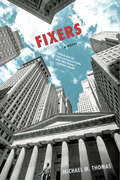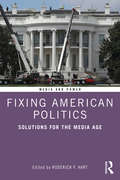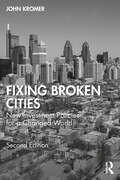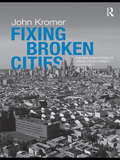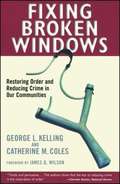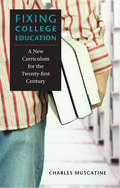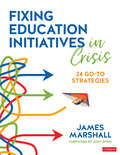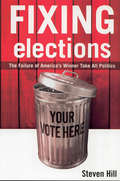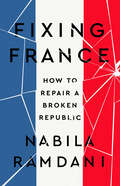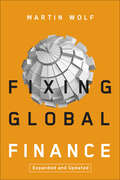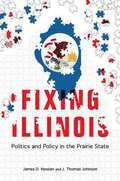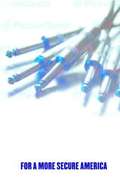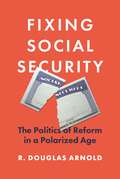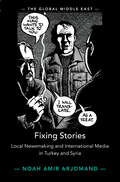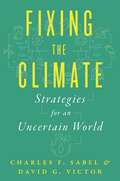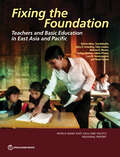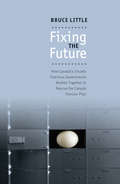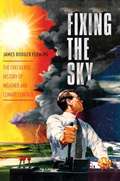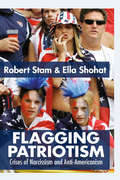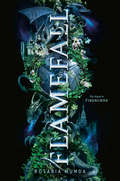- Table View
- List View
Fixers
by Michael M. ThomasFor anyone who's wondered why the money men who caused the 2008 banking crisis ended up running U.S. economic policy, a novel that seems too true to be fiction . . . On a winter's night in 2007, a well-heeled "cultural consultant" named Chauncey Suydam gets a call from the head of the world's most powerful investment bank, who says a financial crisis is brewing, but he has a plan to insulate Wall Street from the fallout--and keep people such as himself out of jail. His mission for Chauncey is simple: to help funnel millions of dollars to a certain presidential candidate preaching hope and change, in exchange for a few Wall Street-friendly names in the resultant administration. Yet as Chauncey wends his way amongst the nation's political elite, he sees with greater clarity than ever how decisions really get made--on Wall Street and in Washington. And as the magnitude of the fix he's perpetrating begins to sink in, he starts to have second thoughts . . . But is it too late? At once shocking and all too plausible, Fixers is a riveting political thriller by a master observer of finance and politics that--despite being fiction--offers a frighteningly reasonable explanation of what really might have happened in 2008.From the Hardcover edition.
Fixing American Politics: Solutions for the Media Age (Media and Power)
by Roderick P. HartFixing American Politics: Solutions for the Media Age brings together original chapters from 34 noted scholars from two disciplines – political science and communication – asked to identify the most pressing problems facing the American people and how they can be solved. Authors address the questions succinctly and directly, with their favored solutions featured in chapter titles that exhort and inspire. The book gives the reader much to think about and debate. Should news outlets be funded with public money rather than by private enterprise? Are the new social media a boon or a bane to political elections? Is the American past dead, or is it living once again? Do churchgoers and environmentalists have anything to discuss? Is the FCC doing its job? Can political ads be made less toxic? Should Fox News be "cancelled?" Should cancel cultures be cancelled? Can we become more civil to one another and, if so, how? Fixing American Politics poses all the best questions … and offers some concrete answers as well. This book is perfect for students, citizens, the media, and anyone concerned with contemporary challenges to civic life and discourse today.
Fixing Broken Cities: New Investment Policies for a Changed World
by John KromerFixing Broken Cities explores the planning, execution, and impact of urban repopulation and investment strategies that were launched in the wake of two crises: late twentieth-century economic disinvestment and the outbreak of the COVID-19 pandemic. Because past practices could no longer serve as a reliable guide to future outcomes in this uncertain environment, any new initiatives had to involve a significant level of risk-taking. Based on the author’s experience as a policymaker and practitioner, this book provides detailed insights into the origins and outcomes of these high-risk strategies, along with an explanation of why they succeeded or failed. This new edition examines policy initiatives from a fresh perspective, based on an awareness that (1) real estate ventures are best evaluated over the long term, rather than shortly after the completion of construction activity; (2) policies that had guided the allocation of public-sector resources during past decades of urban disinvestment need to be reconsidered in light of the economic resurgence that many American cities are now experiencing; and (3) the places described in this book are representative of other municipalities, of all kinds, where the pandemic has led to a fundamental rethinking of the relationship between home and workplace. A key theme of the book is equitable development, the question of who should benefit from the allocation of scarce public capital, and what investment policies are most likely to support this principle over the long term. The author provides realistic guidance about pursuing the best opportunities for improvement in highly disadvantaged, resource-starved urban areas, with reference to several key issues that are pressing concerns for members of urban communities: enlivening downtown and neighborhood commercial areas, stabilizing and strengthening residential communities, eliminating industrial-age blight, and providing quality public education options. This new edition will be of great use to planning, housing and community development professionals, both regionally and nationally, as well as to students on Urban Politics and Planning courses.
Fixing Broken Cities: The Implementation of Urban Development Strategies
by John KromerThrough the insightful lens of an experienced practitioner, this book describes the origin, execution, and impact of urban repopulation strategies—initiatives designed to attract residents, businesses, jobs, shoppers, and visitors to places that had undergone decades of decline and abandonment. The central question throughout the strategies explored in the book is who should benefit? Who should benefit from the allocation of scarce public capital? Who should enjoy the social benefits of urban development? And who will populate redeveloped areas? Kromer provides realistic guidance about how to move forward with strategic choices that have to be made in pursuing the best opportunities available within highly disadvantaged, resource-starved urban areas. Each of the cases presents strategies that are strongly influenced by geography, economics, politics, and individual leadership, but they address key issues that are major concerns everywhere: enlivening downtowns, stabilizing and strengthening neighborhoods, eliminating industrial-age blight, and providing quality public education options.
Fixing Broken Windows: Restoring Order and Reducing Crime in Our Communities
by George L. Kelling Catherine M. ColesBased on a groundbreaking theory of crime prevention, this practical and empowering book shows how citizens, business owners, and police can work together to ensure the safety of their communities. George Kelling, one of America’s leading criminologists, has proven the success of his method across the country, from the New York City subways to the public parks of Seattle. Here, Kelling and urban anthropologist and lawyer Catherine Coles demonstrate that by controlling disorderly behavior in public spaces, we can create an environment where serious crime cannot flourish, and they explain how to adapt these effective methods for use in our own homes and communities.
Fixing College Education: A New Curriculum for the Twenty-first Century
by Charles MuscatineSince his early days at the University of California, Berkeley, when he was fired for refusing to sign a loyalty oath during the Red Scare, Charles Muscatine has been a dedicated teacher and higher education reformer. Upon his reinstatement at Berkeley, he founded "Strawberry Creek College," a six-year experiment using full professors and small classes to teach lower-division students. Drawing on this belief in undergraduate teaching, Muscatine's new book now offers a radical new design for American college education.Muscatine begins with the observation that the mediocre undergraduate curriculum offered by most colleges and universities today is based on outdated ideas of what should be taught and what constitutes good teaching. Although Muscatine is himself a well-established research scholar, he contends that the publish-or-perish "research religion" of college and university faculties has seriously damaged undergraduate education. He offers a clear distinction between publishable research and the scholarship necessary for good teaching. Furthermore, he recommends major changes in the education of professors, including reconsidering both the requirement of the book-length dissertation and the current organization of graduate departments. Fixing College Education predicts new roles for students and faculty, redefines educational breadth and depth, and calls for deeper assessment of learning and teaching. Muscatine highlights the outstanding colleges and universities, including Harvard, Boston University's University Professor's Program, Evergreen State College, and Fairhaven College at Western Washington University, that have already remade their curricula successfully or adopted features like the ones he proposes. Muscatine argues that the new curriculum is better able than the old to produce good scholars and good citizens for the twenty-first century.
Fixing Drugs
by Sue PryceIn this unique and engaging book, Sue Pryce tackles the major issues surrounding drug policy. Why do governments persist with prohibition policies, despite their proven inefficacy? Why are some drugs criminalized, and some not? And why does society care about drug use at all? Pryce guides us through drug policy around the world.
Fixing Education Initiatives in Crisis: 24 Go-to Strategies
by James MarshallProven practices to rescue struggling education initiatives... or prevent a crisis before it starts. Insufficient planning, unclear outcomes, missing data--for leaders overseeing education initiatives, it can often seem like there′s a crisis around every corner. Drawing on decades of experience in assessment, evaluation, and data-driven decision-making, author and Professor of Educational Leadership James Marshall offers a combination of evidence-based practices and real-life experiences that provide practical solutions to the diverse challenges school leaders encounter as they implement new initiatives. Exploring oft-encountered challenges such as poor outcomes, waning interest or support from leadership, public relations issues, scaling and sustainability roadblocks, and other implementation-related obstacles--the book identifies six types of crises confronted by education leaders and offers valuable insights and solutions for each. Features include: Guidance to recognize the six types of education initiative crises and strategies for resolution tailored to each type 24 unique tools to positively impact challenges, such as the "Triage Tool" to prioritize crisis intervention and the "Don’t Swamp the Boat" tool to explore the complement of initiatives in your school Two case studies and real world examples illustrating the application of selected tools across a range of crisis types Whether you’re an education leader dealing with a program or initiative in crisis or proactively looking to prevent a crisis, Fixing Education Initiatives in Crisis provides practical solutions to navigate troubled initiatives and guidance for the design and implementation of healthy initiatives that yield predictable results.
Fixing Education Initiatives in Crisis: 24 Go-to Strategies
by James MarshallProven practices to rescue struggling education initiatives... or prevent a crisis before it starts. Insufficient planning, unclear outcomes, missing data--for leaders overseeing education initiatives, it can often seem like there′s a crisis around every corner. Drawing on decades of experience in assessment, evaluation, and data-driven decision-making, author and Professor of Educational Leadership James Marshall offers a combination of evidence-based practices and real-life experiences that provide practical solutions to the diverse challenges school leaders encounter as they implement new initiatives. Exploring oft-encountered challenges such as poor outcomes, waning interest or support from leadership, public relations issues, scaling and sustainability roadblocks, and other implementation-related obstacles--the book identifies six types of crises confronted by education leaders and offers valuable insights and solutions for each. Features include: Guidance to recognize the six types of education initiative crises and strategies for resolution tailored to each type 24 unique tools to positively impact challenges, such as the "Triage Tool" to prioritize crisis intervention and the "Don’t Swamp the Boat" tool to explore the complement of initiatives in your school Two case studies and real world examples illustrating the application of selected tools across a range of crisis types Whether you’re an education leader dealing with a program or initiative in crisis or proactively looking to prevent a crisis, Fixing Education Initiatives in Crisis provides practical solutions to navigate troubled initiatives and guidance for the design and implementation of healthy initiatives that yield predictable results.
Fixing Elections: The Failure of America's Winner Take All Politics
by Steven HillFixing Elections shows our whole 18th-century Winner Take All political system, including the way we elect our legislatures. Steven Hill argues our geographic-based, Winner Take All political system is at the root of many of our worst political problems, including poor minority and majority representation, low voter turnout, expensive mudslinging campaigns, congressional gridlock, regional balkanization, and the growing divide between city-dwellers and middle-America.
Fixing France: How to Repair a Broken Republic
by Nabila RamdaniA French-Algerian journalist, born and brought up in a neglected Paris suburb, offers unique insight into crisis-ridden France from a very different perspective to the establishment elites France, the romanticized, revolutionary land with an enlightened historical mission—Liberty, Equality, Fraternity for all—is failing its own citizens and its admirers around the world. How did the country get here, and what can be done about it? In Fixing France, Nabila Ramdani assesses the fault lines in her struggling nation with unflinching clarity and originality. The makeshift Fifth Republic, which emerged from the cataclysmic Algerian War of Independence, has produced extremism. Constitutional reform is urgently needed: an all-powerful monarchical president displays little interest in democracy, while a mainstream far-right party founded by Nazi collaborators threatens to deliver a head of state. Segregated suburbs, institutionalized rioting, economic injustice, a monolithic education system, the debasement of women, deep-seated racial and religious discrimination, paramilitary policing, terrorism, and a duplicitous foreign policy all fuel the growing crisis. Ramdani&’s critique is stark but provides real hope: the broken French Republic can and must be fixed.
Fixing Global Finance (Forum on Constructive Capitalism)
by Martin WolfSince 2008, when Fixing Global Finance was first published, the collapse of the housing and credit bubbles of the 2000s has crippled the world’s economy. In this updated edition, Financial Times columnist Martin Wolf explains how global imbalances helped cause the financial crises now ravaging the U.S. economy and outlines steps for ending this destructive cycle—of which this is the latest and biggest. An expanded conclusion recommends near- and long-term measures to stabilize and protect financial markets in the future. Reviewing global financial crises since 1980, Wolf lays bare the links between the microeconomics of finance and the macroeconomics of the balance of payments, demonstrating how the subprime lending crisis in the United States fits into a pattern that includes the economic shocks of 1997, 1998, and early 1999 in Latin America, Russia, and Asia. He explains why the United States became the "borrower and spender of last resort," makes the case that this was an untenable arrangement, and argues that global economic security depends on radical reforms in the international monetary system and the ability of emerging economies to borrow sustainably in domestic currencies.Sharply and clearly argued, Wolf’s prescription for fixing global finance illustrates why he has been described as "the world's preeminent financial journalist."
Fixing Illinois: Politics and Policy in the Prairie State
by James D. Nowlan J. Thomas JohnsonPersistent problems have left Illinois the butt of jokes and threatened it with fiscal catastrophe. In Fixing Illinois, James D. Nowlan and J. Thomas Johnson use their four decades of experience as public servants, Springfield veterans, and government observers to present a comprehensive program of almost one hundred specific policy ideas aimed at rescuing the state from its long list of problems. Nowlan and Johnson start with the history of how one of the most prosperous states of the 1950s became a present-day mess riven by debt and discord and increasingly abandoned by both businesses and citizens. Among their more than ninety proposals to restore Illinois to greatness: * An overhaul of state pension systems that includes more reasonable benefits and lengthening of the retirement age, among other changes; * Reducing one of the nation's highest corporate tax rates to attract business; * Medicare reform through an insurance voucher program; * Demanding that schools raise expectations for success, particularly in rural and impoverished urban areas; * A new approach to higher education that includes a market-driven system that puts funds in the hands of students rather than institutions; * Broadening of the tax base to include services and reduction in rates; * The creation of a long-term plan to maintain the state's five-star transportation infrastructure; * Raising funds with capital construction bonds to update and integrate the antiquated information systems used by state agencies; * Uprooting the state's entrenched culture of corruption via public financing of elections, redistricting reform, and revolving door prohibitions for lawmakers. Pointed, honest, and pragmatic, Fixing Illinois is a plan for effective and honest government that seeks an even nobler end: restoring our faith in Illinois's institutions and reviving a sense of citizenship and state pride.
Fixing Intelligence: For a More Secure America
by William E. OdomBasing his text in large part on a study he authored in 1997, published by the National Institute of Public Policy, Odom (a senior fellow at the Hudson Institute and a former director of the National Security Agency) considers recommendations for the reform of American intelligence activities and organization. Among his suggestions are granting more intelligence oversight authority over all the diverse intelligence organizations to the Director of Central Intelligence; eliminating CIA obstructionism in expanding military intelligence capabilities; recognizing the need to have national managers for the separate disciplines of signals, imagery, and human intelligence; and taking counterintelligence activities out from under the provenance of the law enforcement agencies. Annotation ©2004 Book News, Inc. , Portland, OR (booknews. com)
Fixing Medical Prices
by Miriam J. LaugesenMiriam Laugesen goes to the heart of U.S. medical pricing: to a largely unknown committee of organizations affiliated with the American Medical Association. Medicare's ready acceptance of this committee's advisory recommendations sets off a chain reaction across the American health care system, leading to high--and disproportionate--rate setting.
Fixing Social Security: The Politics of Reform in a Polarized Age
by R. Douglas ArnoldHow Social Security has shaped American politics—and why it faces insolvencySince its establishment, Social Security has become the financial linchpin of American retirement. Yet demographic trends—longer lifespans and declining birthrates—mean that this popular program now pays more in benefits than it collects in revenue. Without reforms, 83 million Americans will face an immediate benefit cut of 20 percent in 2034. How did we get here and what is the solution? In Fixing Social Security, R. Douglas Arnold explores the historical role that Social Security has played in American politics, why Congress has done nothing to fix its insolvency problem for three decades, and what legislators can do to save it.What options do legislators have as the program nears the precipice? They can raise taxes, as they did in 1977, cut benefits, as they did in 1983, or reinvent the program, as they attempted in 2005. Unfortunately, every option would impose costs, and legislators are reluctant to act, fearing electoral retribution. Arnold investigates why politicians designed the system as they did and how between 1935 and 1983 they allocated—and reallocated—costs and benefits among workers, employers, and beneficiaries. He also examines public support for the program, and why Democratic and Republican representatives, once political allies in expanding Social Security, have become so deeply polarized about fixing it.As Social Security edges closer to crisis, Fixing Social Security offers a comprehensive analysis of the political fault lines and a fresh look at what can be done—before it is too late.
Fixing Stories: Local Newsmaking and International Media in Turkey and Syria (The Global Middle East)
by Noah Amir ArjomandNews 'fixers' are translators and guides who assist foreign journalists. Sometimes key contributors to bold, original reporting and other times key facilitators of homogeneity and groupthink in the news media, they play the difficult but powerful role of broker between worlds, shaping the creation of knowledge from behind the scenes. In Fixing Stories, Noah Amir Arjomand reflects on the nature of news production and cross-cultural mediation. Based on human stories drawn from three years of field research in Turkey, this book unfolds as a series of narratives of fixers' career trajectories during a period when the international media spotlight shone on Turkey and Syria. From the Syrian Civil War, Gezi Park protest movement, rise of authoritarianism in Turkey and of ISIS in Syria, to the rekindling of conflict in both countries' Kurdish regions and Turkey's 2016 coup attempt, Arjomand brings to light vivid personal accounts and insider perspectives on world-shaking events alongside analysis of the role fixers have played in bringing news of Turkey and Syria to international audiences.
Fixing the Climate: Strategies for an Uncertain World
by David G. Victor Charles F. SabelSolving the global climate crisis through local partnerships and experimentationGlobal climate diplomacy—from the Kyoto Protocol to the Paris Agreement—is not working. Despite decades of sustained negotiations by world leaders, the climate crisis continues to worsen. The solution is within our grasp—but we will not achieve it through top-down global treaties or grand bargains among nations.Charles Sabel and David Victor explain why the profound transformations needed for deep cuts in emissions must arise locally, with government and business working together to experiment with new technologies, quickly learn the best solutions, and spread that information globally. Sabel and Victor show how some of the most iconic successes in environmental policy were products of this experimentalist approach to problem solving, such as the Montreal Protocol on the ozone layer, the rise of electric vehicles, and Europe’s success in controlling water pollution. They argue that the Paris Agreement is at best an umbrella under which local experimentation can push the technological frontier and help societies around the world learn how to deploy the technologies and policies needed to tackle this daunting global problem.A visionary book that fundamentally reorients our thinking about the climate crisis, Fixing the Climate is a road map to institutional design that can finally lead to self-sustaining reductions in emissions that years of global diplomacy have failed to deliver.
Fixing the Facts: National Security and the Politics of Intelligence
by Joshua RovnerWhat is the role of intelligence agencies in strategy and policy? How do policymakers use (or misuse) intelligence estimates? When do intelligence-policy relations work best? How do intelligence-policy failures influence threat assessment, military strategy, and foreign policy? These questions are at the heart of recent national security controversies, including the 9/11 attacks and the war in Iraq. In both cases the relationship between intelligence and policy broke down-with disastrous consequences. In Fixing the Facts, Joshua Rovner explores the complex interaction between intelligence and policy and shines a spotlight on the problem of politicization. Major episodes in the history of American foreign policy have been closely tied to the manipulation of intelligence estimates. Rovner describes how the Johnson administration dealt with the intelligence community during the Vietnam War; how President Nixon and President Ford politicized estimates on the Soviet Union; and how pressure from the George W. Bush administration contributed to flawed intelligence on Iraq. He also compares the U.S. case with the British experience between 1998 and 2003, and demonstrates that high-profile government inquiries in both countries were fundamentally wrong about what happened before the war.
Fixing the Foundation: Teachers and Basic Education in East Asia and Pacific (World Bank East Asia and Pacific Regional Report)
by Aaditya Mattoo Tara Beteille Rythia Afkar Mary Breeding Linden Tobias Pfutze Lars Sondergaard Noah YarrowCountries in middle-income East Asia and the Pacific were already experiencing serious learning deficits prior to the COVID-19 pandemic. COVID-related school disruptions have only made things worse. Learning poverty -- defined as the percentage of 10-year-olds who cannot read and understand an age-appropriate text -- is as high as 90 percent in several countries. Several large Southeast Asian countries consistently perform well below expectations on adolescent learning assessments. This report examines key factors affecting student learning in the region, with emphasis on the central role of teachers and teaching quality. It also analyzes the role education technologies, which came into widespread use during the pandemic, and examines the political economy of education reform. The report presents recommendations on how countries can strengthen teaching to improve learning and, in doing so, can enhance productivity, growth, and future development in the region.
Fixing the Future: How Canada's Usually Fractious Governments Worked Together to Rescue the Canada Pension Plan
by Bruce LittleIn 1993, most Canadians believed that big government deficits were permanent and that the Canada Pension Plan (CPP) was in such deep trouble that younger Canadians would never collect a retirement pension. They believed too that Canada's politicians were incapable of dealing with either problem. Yet by 1998, both were essentially solved.<P><P> While the deficit battles have been recounted many times, the story of the reform that rescued the CPP has gone almost entirely untold. In Fixing the Future, Bruce Little explains the CPP overhaul and shows why it stands as one of Canada's most significant public policy success stories, in part because it demanded an almost unparalleled degree of federal-provincial co-operation. Providing an overview of the CPP's entire history from its beginning in 1965, Little pulls together published, and new unpublished, material relating to the CPP reform, and interviews over fifty politicians, government officials, and others who were deeply involved in the reforms for their recollections, insights, and observations.<P> A superbly told history of one of Canada's most important public policy issues, Fixing the Future will be of interest to political scientists, historians, economists, and anyone concerned about their retirement.
Fixing the Sky: The Checkered History of Weather and Climate Control (Columbia Studies in International and Global History)
by James FlemingAs alarm over global warming spreads, a radical idea is gaining momentum. Forget cuts in greenhouse gas emissions, some scientists argue. Instead, bounce sunlight back into space by pumping reflective nanoparticles into the atmosphere. Launch mirrors into orbit around the Earth. Make clouds thicker and brighter to create a "planetary thermostat."These ideas might sound like science fiction, but in fact they are part of a very old story. For more than a century, scientists, soldiers, and charlatans have tried to manipulate weather and climate, and like them, today's climate engineers wildly exaggerate what is possible. Scarcely considering the political, military, and ethical implications of managing the world's climate, these individuals hatch schemes with potential consequences that far outweigh anything their predecessors might have faced.Showing what can happen when fixing the sky becomes a dangerous experiment in pseudoscience, James Rodger Fleming traces the tragicomic history of the rainmakers, rain fakers, weather warriors, and climate engineers who have been both full of ideas and full of themselves. Weaving together stories from elite science, cutting-edge technology, and popular culture, Fleming examines issues of health and navigation in the 1830s, drought in the 1890s, aircraft safety in the 1930s, and world conflict since the 1940s. Killer hurricanes, ozone depletion, and global warming fuel the fantasies of today. Based on archival and primary research, Fleming's original story speaks to anyone who has a stake in sustaining the planet.
Flag, Nation and Symbolism in Europe and America
by Thomas Hylland Eriksen Richard JenkinsAlthough the symbolic and political importance of flags has often been mentioned by scholars of nationalism, there are few in-depth studies of the significance of flags for national identities. This multi-disciplinary collection offers case studies and comparisons of flag history, uses and controversies. This book brings together a dozen scholars, from varying national and disciplinary backgrounds, to offers a cluster of close readings of flags in their social contexts, mostly contemporary, but also historical. Case studies from Denmark, England, Northern Ireland, Norway, Sweden, and the United States explore ways in which flags are contested, stir up powerful emotions, can be commercialised in some contexts but not in others, serve as quasi-religious symbols, and as physical boundary markers; how the same flag can be solemn and formal in one setting, but stand for domestic bliss and informal cultural intimacy in another.
Flagging Patriotism: Crises of Narcissism and Anti-Americanism
by Ella Shohat Robert StamThe question "Why do they hate us?" is one of the most oft-cited puzzles of contemporary American affairs, yet it’s not clear to whom "they" or "us" refers, nor even what "hate" means. In this bold new work, Ella Shohat and Robert Stam take apart the "hate discourse" of right-wing politics, placing it in an international context. How, for example, do other nations love themselves, and how is that love connected to their attitudes toward America? Is love of country "monogamous" or can one love many countries? When can a country’s self-love be a symptom of self-hatred? Drawing upon their extensive experience with South American, European, and Middle Eastern societies, the authors have written a long engagement with a problem that refuses to go away. Flagging Patriotism considers these complex features of "being patriotic," and in so doing insists that the idea of patriotism, instead of being rejected or embraced, be accorded the complex identity it possesses.
Flamefall (THE AURELIAN CYCLE #2)
by Rosaria MundaRevolutionary flames ignite around Annie, Lee, and a brand new character in the follow-up to FIREBORNE.After fleeing the revolution and settling into the craggy cliffs of New Pythos, the dragonlords are eager to punish their usurpers and reclaim their city. Their first order of business was destroying the Callipolan food supply. Now they're coming for the dragonriders.Annie is Callipolis's new Firstrider, charged with leading the war against New Pythos. But with unrest at home, enforcing the government's rationing program risks turning her into public enemy number one.Lee struggles to find his place after killing kin for a leader who betrayed him. He can support Annie and the other Guardians . . . or join the rebels who look to topple the new regime.Griff, a lowborn dragonrider who serves New Pythos, knows he has no future. And now that Julia Stormscourge is no longer there to protect him, he is called on to sacrifice everything for the lords that oppress his people--or to forge a new path with the Callipolan Firstrider seeking his help.With famine tearing Callipolis apart and the Pythians determined to take back what they lost, it will be up to Annie, Lee, and Griff to decide who--and what--to fight for.
